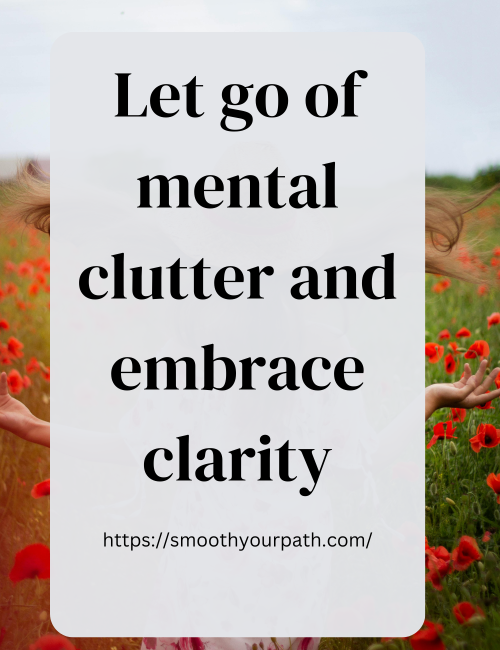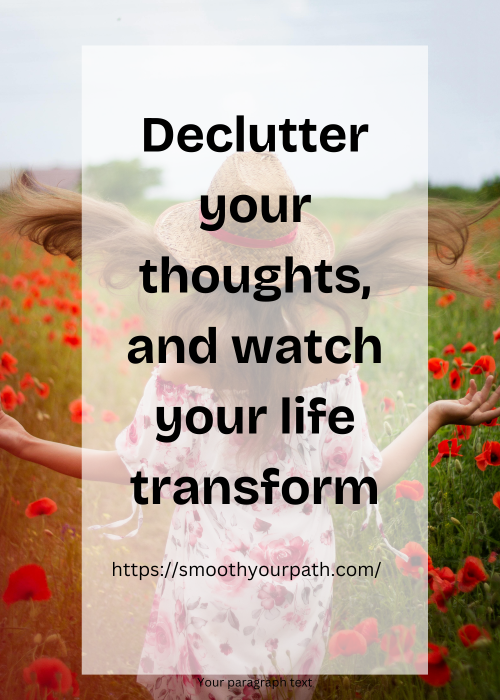Declutter Your Mind: Effortless Techniques for Mental Health
Mental decluttering is essential in today’s world if you want to be more productive and free from stress and anxiety.
It’s an inexpensive, vital, and effective method of achieving mental clarity, enhancing overall well-being, and boosting productivity.

Why Declutter Your Mind is Important
Think about how you feel when you’re in a quiet and peaceful place. You can relax and feel calm.
On the other hand, being in a noisy and chaotic environment can be very stressful and cause anxiety.
The same thing happens inside us. If we’re filled with negative emotions, pain, and past traumas, our minds can’t truly relax.
This inner chaos stops us from working effectively and being productive. To clear our minds and boost productivity, it’s essential to heal these emotional wounds.
Signs You Need to Declutter Your Mind
When you feel weighed down, stressed, and overwhelmed by too many thoughts, it becomes difficult to make decisions or think clearly.
If you find yourself stuck in a loop of racing thoughts and struggling to sleep properly, it’s a sign that it’s time to declutter your mind. Recognize this situation and take steps to regain mental clarity, peace, and better sleep.
The Benefits of Declutter Your Mind
Decluttering your mind can significantly improve your quality of life. Here are some benefits you can experience in this decluttering journey.
- Increase Productivity
- Reduce stress and Anxiety
- Better quality sleep
- Improved Decision-Making Quality
- Enhance Creative Abilities
- Emotional balance

Tips for Declutter Your Mind
Modern life constantly bombards us with information—messages, calls, notifications from social media, and more. It can be overwhelming to keep up with everything and remember all the important details.
To stay productive and up-to-date, it’s essential to declutter your mind and simplify your daily routine. These are some great techniques for unloading the mind.
The Power of Brain Dumping
Instead of trying to remember everything, write down on paper whatever comes to mind.
Your brain isn’t meant to store everything; it’s an important part of your body, meant to create ideas and control your body, so use it wisely.
Keep a note of your important work and to-do lists. This way, you won’t have to remember everything every day.
Writing things down helps you stay clear-headed and organized. It gives you direction and purpose and allows you to look back at your progress.

Leave the Past Behind
When we carry pain, negative emotions, and stress from our past into our present, it impacts our brain and body. This toxic cycle spreads throughout our system, affecting our overall well-being.
Scientifically, it’s proven that our brain receives sensations from our body and then the brain gives orders to our sensory organs to respond. Therefore, if our mind is burdened with stress and negative emotions, it will impact our bodies, leading to poor health.
Write Journal

Journaling is a great way to clear your mind by organizing and expressing your thoughts and feelings.
Writing down what’s on your mind each day can help you identify patterns, gain insights into your emotions, and bring a sense of calm. It is scientifically proven, it may be tough to start but it makes sense and I am also working on it.
Over time, this practice promotes self-awareness and helps you focus better, making it a simple yet effective tool for mental decluttering.
.
Clean your Environment
It is scientifically proven that a clean and calm environment profoundly influences our mental state and productivity.
A cluttered room or desk often mirrors the chaos in our minds, making it harder to concentrate or think clearly.
On the other hand, when you clean your room or workspace, you’re not just clearing physical clutter—you’re also creating mental space.
A clean and organized space helps you feel calmer, less stressed, and more focused on what you need to do.
Physical Exercise
Research shows that physical exercise has a positive impact on mental health. During exercise, the body releases hormones such as endorphins, which help regulate mood and reduce feelings of stress and anxiety. Therefore, if you’re feeling emotionally low, engaging in activities like jogging, walking, or any form of physical exercise can uplift your mood and improve your overall well-being.
Stop Task-Switching Without Break
Most of the time we switch from one task to another without taking a moment to pause. This habit can hurt mental health, as it overstimulates the brain.
Over time, continuous task-switching can lead to mental fatigue, decreased productivity, and heightened stress levels.
Short breaks allow the mind to rest, process information more effectively, and restore focus.
Making time for mindful pauses in your routine is essential for sustaining a healthier, more balanced mental state.
Mindfulness and Meditation
We often spend too much time thinking about the past or worrying about the future, which fills our minds with unnecessary thoughts.
When we live in the moment, we let go of distractions and give our full attention to what matters now.
Meditation is a great practice for decluttering your mind. Sitting quietly and focusing on your inner self helps you notice what’s holding you back.
In today’s fast-paced world, it’s important to take a moment to slow down, reflect, and reconnect with yourself.
Meditation clears the mind, helps you feel calmer, and allows you to focus on what’s truly important.

Spend Time with Nature
We live in a world dominated by concrete structures, technology, and the internet. Yet, as human beings, we are deeply connected to nature, it’s an essential part of us.
Take a break from your hectic schedule and spend time surrounded by nature, with its flowers and rivers. Just go on a vacation with your family and friends; you’ll find yourself feeling naturally relaxed, calm, and rejuvenated.
Take Action
Now it’s your turn to take action! Think about these tips and try to include them in your daily routine. Which part of the blog did you like the most? What will you try first?
FAQ Re-invent yourself
1. How to detox mentally?
- Talk with yourself
- Spend time with nature
- Mindfulness or living in the present
- Meditation
- Reflection of yourself
- Physical exercise
2. What happens to your brain when you declutter?
Decluttering has a positive impact on the brain. This helps improve focus, decision-making, and overall mental clarity. A clutter-free space and mind promotes a sense of calm and control, which can lower stress levels and boost your mood.
3. What is the 90 90 rule for decluttering?
If there’s something you haven’t used in the past 90 days and don’t plan to use in the next 90 days, it’s a clear sign you don’t need it anymore—so let it go. Decluttering not only creates a clean and organized home but also helps calm your mind and reduce stress.
Disclaimer
SmoothYourPath.com provides general guidance, insights, and personal development resources for informational purposes only. We are not certified counselors, therapists, or medical professionals, and the content on our website should not be interpreted as professional mental health, medical, or legal advice.
If you require professional support, we strongly encourage you to seek assistance from a qualified counselor, therapist, or healthcare provider. Any reliance on the information provided on this website is solely at your discretion.
SmoothYourPath.com is not responsible for any decisions made based on the content shared here.
👍👍👍👍👍👍👍👍👍👍👍👍👍👍👍👍👍👍👍👍👍👍👍👍👍👍👍👍👍👍👍❤
Thank Aditiya